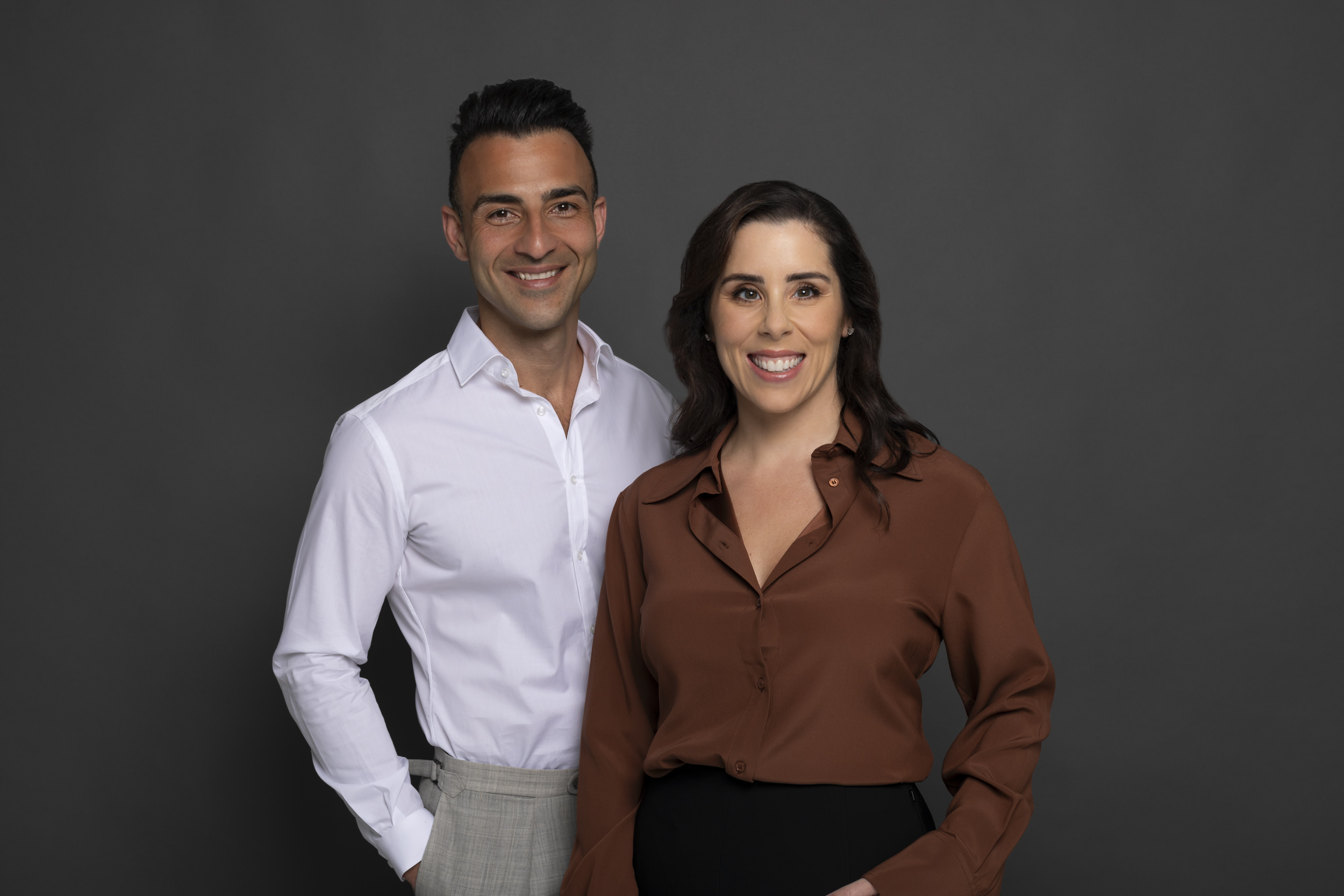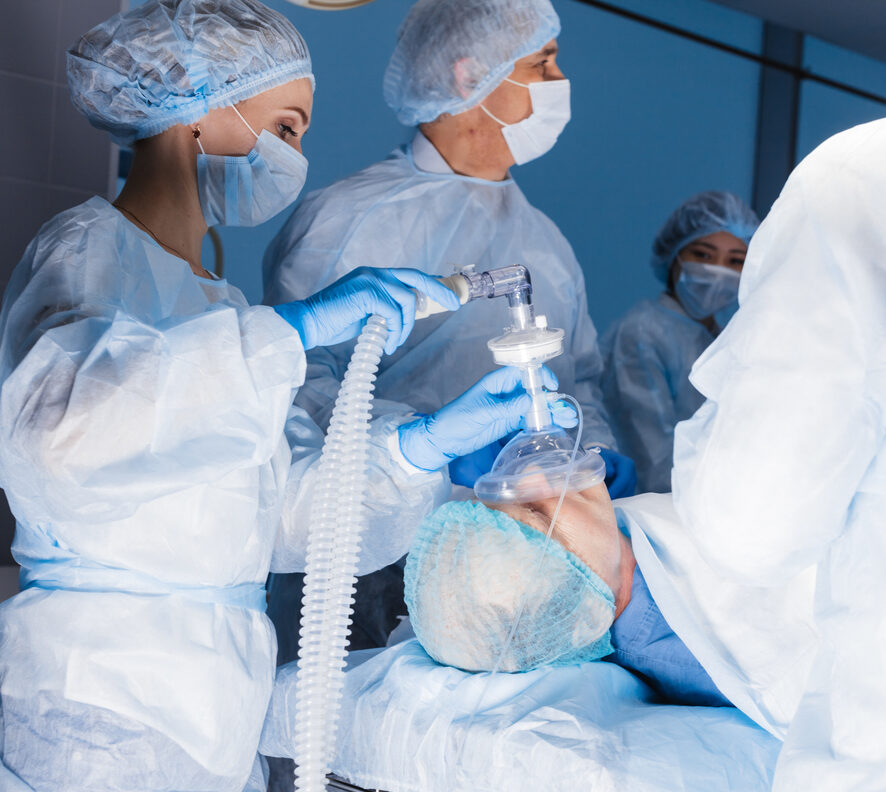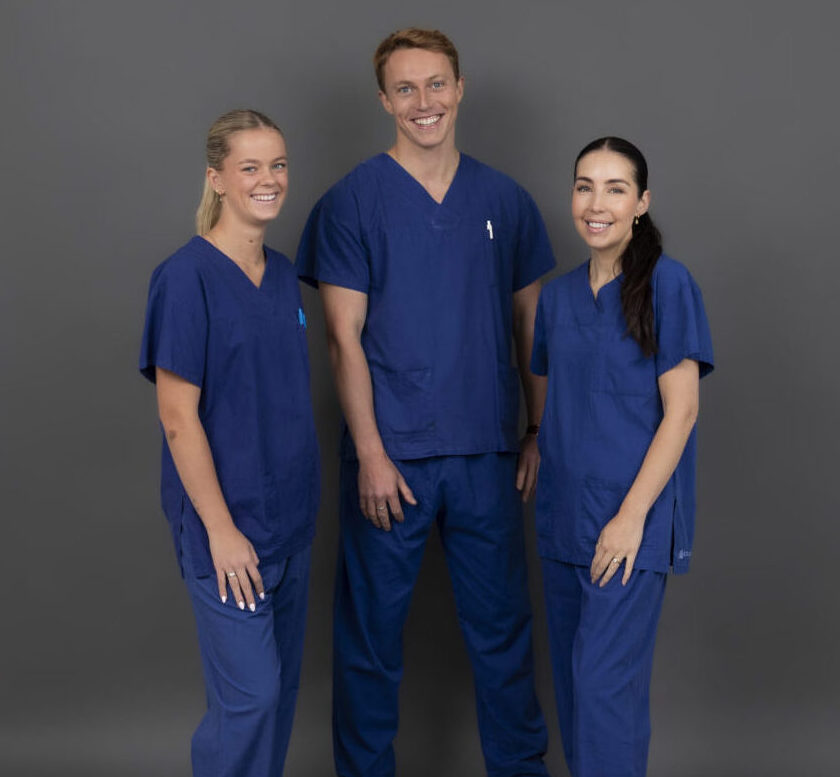Anaesthetics are a group of medications that cause a loss of sensation. They are used to ensure you are asleep or sedated during your procedure. Anaesthetists specialise in the administration of these medications to ensure you remain safe during your medical procedure, with minimal pain and distress.
Your anaesthetist is a medical doctor who has completed a medical degree. After completing medical school and a minimum of three years of general medical training, your doctor is then accepted to commence further training to become an anaesthetist. This consists of an additional five years of comprehensive education and training in anaesthesia and completing two rigorous exams before being admitted as a Fellow of the Australian and New Zealand College of Anaesthetists (FANZCA). Your anaesthetist specialises in administering anaesthesia to patients before and during surgical procedures or other medical treatments. The objective of anaesthesia practice is to minimise pain and distress during surgery and medical procedures.
Your Anaesthetist works closely with your surgeon and other medical professionals to determine the appropriate type and amount of anaesthesia needed, taking into consideration your medical history, current health and the nature of your procedure. We will monitor you throughout your procedure to ensure you are safe and adjust the anaesthesia as necessary.
Throughout your perioperative journey, your anaesthetist will accompany you every step of the way.
Before your surgery, they will consult with you, carefully examine your medical and anaesthesia history and discuss the anaesthetic plan along with its associated risks and benefits.
During the surgical procedure, your anaesthetist assumes a crucial role in ensuring your safety and comfort. They will be present throughout the procedure to closely monitor and adjust your anaesthesia as needed. Following the surgery, your anaesthetist will continue to monitor your recovery from anaesthesia and ensure your stability before transferring you to the recovery room.
There are four different types of Anaesthesia which vary based on the type of surgical operation you undergo.
General Anaesthetic:
You are put into a state of unconsciousness and are unaware for the duration of the surgical procedure. To achieve this, medication is administered through an intravenous injection or an inhalational gas. While you remain unconscious throughout your procedure your anaesthetist monitors you closely and constantly, adjusting the anaesthetic as required.
Sedation:
This type of anaesthesia, sometimes called “twilight anaesthesia” is used to help you relax and feel more comfortable during minor surgery, medical procedures, or diagnostic tests. It can be administered through an intravenous injection or inhalation of gas. The level of sedation can be adjusted as needed.
Local Anaesthetic:
This type of anaesthesia is used to numb a specific area of your body for a small surgical incision, removal of sutures, or a dental procedure. It is usually administered through a small injection or topical administration. You will generally remain awake, but will not feel pain.
Regional Anaesthetic:
This type of anaesthesia is used to numb large areas of your body, such as an entire limb or a portion of your abdomen, where your surgeon needs to operate. You may be awake, sedated, or under general anaesthesia following or during this procedure. Examples of regional anaesthesia include epidurals for labour, spinal anaesthesia for a Caesarean section, and eye blocks for cataract surgery.
Your anaesthetic fee is determined by several factors, including the nature and complexity of your surgery, the level of anaesthetic intervention required, and the combined surgical and anaesthetic duration.
Blood thinning medication Changes may be made to blood thinning medications prior to surgery to reduce the risk of bleeding complications. The decision to change these medications is based on the medication type, your medical history and the type of surgical procedure.
Examples of these medications include:
• Warfarin (Coumadin, Marevan)
• Aspirin
• Clopidogrel (Plavix)
• Apixaban (Eliquis)
• Rivaroxaban (Xarelto)
• Enoxaparin (Clexane)
• Dabigatran (Pradaxa)
Medications that impact blood sugar levels If you are taking medications for diabetes or for other medical conditions that impact your blood sugar levels, you must advise your surgeon and anaesthetist prior to your procedure. Many procedures involve fasting prior to the procedure. This will cause a natural drop in your blood sugar levels, meaning you will likely not require your normal dose of these medications.
Examples of medications that impact blood sugar levels include:
• Metformin
• Dapagliflozin (Forxiga, Qtern)
• Empagliflozin (Jardiance)
• Gliclazide
• Sitagliptin
• Semaglutide (Ozempic)
• Insulin
Insulin:
If you are administering insulin for the control of your diabetes, you will need to discuss how best to manage your insulin regime with your anaesthetist and surgeon prior to your surgery or medical procedure. You may be advised to take less insulin or no insulin prior to your surgery or medical procedure. If you have diabetes, it is important to work with your medical specialists to review your current diabetes management plan, and make any necessary adjustments to your medications and/or insulin regimen prior to your surgery or medical procedure.
It is important that your diabetes control is optimised before your surgery or medical procedure to decrease your risk of complications and improve your recovery.
Heart disease It is important that your anaesthetist is made aware of any heart condition prior to surgery. It is important that your heart condition is well optimised before your anaesthetic to decrease the risk of perioperative heart complications. Please advise your anaesthetist if you have: a prosthetic heart valve, permanent pacemaker (PPM), defibrillator, coronary artery stents or if you have had open heart surgery.
Obstructive sleep apnoea If you have formally been diagnosed with sleep apnoea, snore, or you stop breathing during your sleep, please advise your anaesthetist prior to surgery. These conditions can cause serious complications during and after your procedure. Your anaesthetist can plan your anaesthetic, medication and post operative care for additional monitoring. If you use a CPAP machine, please bring this into the hospital if you are staying overnight.
Alcohol It is recommended that if you are undergoing a surgical procedure that you do not drink alcohol the day before and the day of the operation or procedure. Alcohol can have negative effects on your liver and your ability to metabolise medications. It can increase your risk of intraoperative bleeding, infections, and hamper your wound healing. Alcohol can also affect the liver's ability to metabolise the drugs used during anaesthesia, leading to potential adverse reactions or interactions.
It is important to tell your anaesthetist how much you drink to assist them with your care plan. If you are a medium to heavy drinker, it is recommended you develop a plan to safely reduce your alcohol consumption in the lead up to your surgery. Please consult your GP to assist with withdrawal symptoms.
Smoking It is crucial that you stop smoking immediately. Smoking can significantly increase your risk of complications during and after surgery. Smoking also affects your lung function which can lead to difficulties with anaesthesia and postoperative lung failure. Quitting smoking at least 4 weeks before surgery can reduce your risks and improve your overall surgical outcomes. Patients who quit smoking before surgery can expect improved lung function, reduced risk of complications, faster healing, and overall better outcomes.
Preoperative fasting refers to the period of time a patient needs to abstain from consuming any food or liquids prior to undergoing surgery or certain medical procedures.
It is important to adhere to these guidelines to reduce the risk of complications during and after the procedure. The guidelines may vary depending on the type of procedure, age of the patient and other factors. It is always best to check with your doctor before surgery. As a general rule, you are advised to avoid eating solid food for at least 6 hours and clear liquids for 2 hours prior to your surgery or procedure.
Prescription medications can be taken with a small amount of water even whilst fasting.
While anaesthesia is generally safe there can be complications and side effects as with any medical procedure. Complications can vary depending on the type of anaesthesia used, the patient's medical history, and the nature of the surgery. Some potential complications of anaesthesia include:
Allergic reactions:
Some patients may have allergies to certain anaesthesia medications leading to allergic reactions ranging from mild skin irritation to severe anaphylaxis, which is a life-threatening condition. Anaesthetists are trained to recognise and treat allergic reactions in the operating room. However, an important part of treatment of any allergic reaction is prevention. If you have any history of swelling of the face or generalised itching you should let your anaesthetist know. Nausea and vomiting After receiving anaesthesia, some patients may experience postoperative nausea and vomiting which can cause discomfort and delayed recovery.
Postoperative Nausea:
Postoperative nausea and vomiting (PONV) is a common complication following surgery, affecting up to 40% of patients. It can occur shortly after the surgery or up to several days afterwards. PONV is caused by a variety of factors such as the type of surgery, anaesthesia used, patient risk factors and medications given during surgery. PONV more commonly occurs in women, people with a history of motion sickness, a history of PONV and use of certain medications. Symptoms can include feelings of nausea, vomiting and general discomfort. PONV can lead to dehydration, electrolyte imbalances and delayed discharge from the hospital. Fortunately, there are several strategies for preventing and managing PONV. To help minimise impact on patient recovery, we can work with patients prior to surgery to identify risk factors and develop personalised plans for managing PONV.
Eye Injury:
Various types of eye damage may occur. The cornea or surface of the eye may be scratched when the eyelids are not completely closed, particularly if the face is covered with drapes or towel. This is more common in certain positions such as prone position (lying flat on your stomach). The presence of makeup and eyelash extensions is potentially hazardous. Blindness after both general and regional anaesthesia is rare, but it can occur. Loss of vision may result from pressure on the eye. It may be that the arteries at the back of the eye (retina) become compressed thus depriving the eye of oxygen. Smokers are more at risk than non-smokers because nicotine constricts or narrows arteries, further depriving the eye and the brain of oxygen.
Dental Injury:
Although we are very careful to avoid contact with the teeth, damage may occur when metal or hard plastic instruments are used to maintain an open airway, to help with insertion of the breathing (endotracheal) tube, or to suck out secretions from the mouth and back of the throat. It can also occur upon emergence from anaesthesia when the breathing tube is being removed. Dental damage occurs at about 1 in every 1000 intubations. If you have had dental work, especially on your front teeth you should inform your anaesthetist and discuss any concerns you might have. You should also point out any teeth which are damaged or loose. Children may undergo anaesthesia when their first teeth are about to be lost. These first teeth are very easily dislodged and you should tell the anaesthetist which teeth are loose or already damaged.
Aspiration Inhaled:
Aspiration inhaled stomach contents or saliva can enter your lungs during the induction of anaesthesia which may cause aspiration pneumonia, a serious respiratory complication. Heart complications Anaesthesia can affect your heart leading to changes in blood pressure, heart rate, and rhythm. This can be of particular concern for patients with pre-existing heart conditions, leading to heart attacks (myocardial infarction) and strokes (cerebrovascular accident). These are rare but serious complications of anaesthesia. Lung complications Anaesthesia can depress your respiratory system leading to shallow breathing or in some cases respiratory failure.
Other common lung complications of anaesthesia include bronchospasm, laryngospasm, vocal cord injury, and pneumothorax. Your anaesthetist is trained to deal effectively with these potentially serious respiratory complications. Neurological complications Very rarely you may experience neurological complications after anaesthesia such as confusion, memory loss, or nerve damage. On very rare occasions some patients may suffer brain damage due to lack of oxygen delivery to the brain.
Awareness Under Anaesthesia:
In very rare cases, some patients may regain consciousness during surgery while under general anaesthesia, experiencing sensations or awareness of the procedure. Delayed emergence Some patients may take longer than expected to wake up after anaesthesia which can be due to various factors including drug interactions or patient-specific responses. Postoperative cognitive dysfunction (POCD) In some cases, especially in older adults, anaesthesia has been associated with temporary cognitive decline or confusion after surgery. Infections and other complications
As with any medical procedure, there is a risk of infection at the site of administration or in the body as a whole. It is essential for you to provide your anaesthetist with a detailed medical history including any allergies or previous reactions to medications, food, or other substances to help minimise the risk of complications. Your anaesthetist carefully monitors you to promptly address any potential issues that may arise. Overall, anaesthesia is considered safe for the majority of patients.
Following your procedure, we will recover you from your anaesthetic and transfer you to the Post Anaesthesia Care Unit (PACU).
Here, we will ensure that you are safe, comfortable and we will monitor your transition from the effects of anaesthesia to a stable conscious state. Your vital functions are monitored; your postoperative pain and nausea are managed; and you are deemed safe for discharge from PACU.
If you are being discharged home from a day procedure, your anaesthetist will have a plan with regards to your postoperative pain and nausea management.
If any concerns arise, the Nurse Practitioner immediately escalates them to the anaesthetist. This ensures the anaesthetist has a complete and accurate understanding of your health before your consultation, and that you arrive for surgery informed and ready. By addressing potential issues ahead of time, the program also helps reduce last-minute surgical cancellations, which can be inconvenient for patients, surgeons, and anaesthetists.
It’s important to note that the Nurse Practitioner consultation does not replace your anaesthetist’s consultation. Instead, they work together with the anaesthetist to enhance safety, streamline your care, and make your surgical experience as smooth and comfortable as possible.








